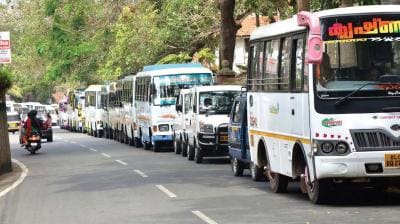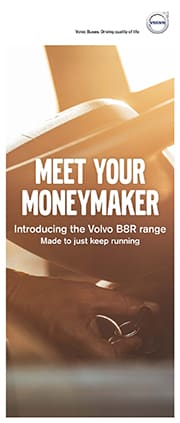Illegally Parked Buses
 A number of illegally parked buses in the state of Penang, Malaysia are causing residents headache as the vehicles are parked by the roadside of Relau residential area. Some 100 factory buses parked there are causing nearby residents difficulty in driving around the area as well as air and noise pollution.
A number of illegally parked buses in the state of Penang, Malaysia are causing residents headache as the vehicles are parked by the roadside of Relau residential area. Some 100 factory buses parked there are causing nearby residents difficulty in driving around the area as well as air and noise pollution.
Although there are two pieces of land located in Batu Maung, and in close proximity to the Penang Second Bridge, which can be used by bus drivers to park their vehicle, it would come with a hefty price tag. A driver would have to fork out RM 224 a month for the Batu Maung bus park whereas the fee for the bus park nearby Penang Second Bridge would set the driver back by RM 180 monthly.
After parking the bus in the park, the drivers also encounter another problem where they have to arrange for transport back to their own residence from the bus park. This could be the reason why a majority of drivers would opt to park their buses illegally in residential areas instead. Bus operators instead should consider the cost of parking the vehicle and discuss with state authoritiesto come up with a better plan to help bus drivers park their vehicle legally and not be a nuisance to other residents.
As an initiative to decrease the number of illegally parked buses, the Penang Island City Council (MBPP) is collaborating with Penang Development Corporation (PDC), Land Public Transport Commission (SPAD), and the Royal Malaysian Police (PDRM) to decrease the number of buses parked illegally in residential areas. Starting from 13 March 2018, buses found parked by the road or in residential areas will be clamped or towed and compounds will be issued.
The penalty to unclamp the buses would cost the driver RM 100 for buses below three tonnes and RM 150 for buses above three tonnes. The penalty does not end there. Drivers would additionally have to fork out RM 300 (for buses below three tonnes) and RM 400 (for buses above three tonnes) respectively to reclaim the bus should it have been towed to the MBPP depot. Bus operators would also face compounds of between RM 500 and RM 500000 from SPAD or risk having their vehicle towed away. Authorities are hoping the heavy price tag would deter the bus drivers from parking illegally in residential areas.
It should be noted that by right, factory bus operators should have a bus depot as it is listed as one of the requirements for operators to obtain their permit. Therefore, should bus operators have provided an appropriate bus depot for its drivers to park the vehicle, the problem might not have been an issue in the first place.



























